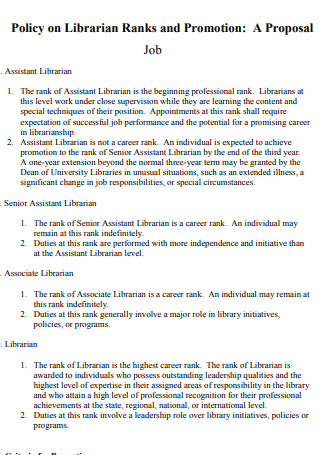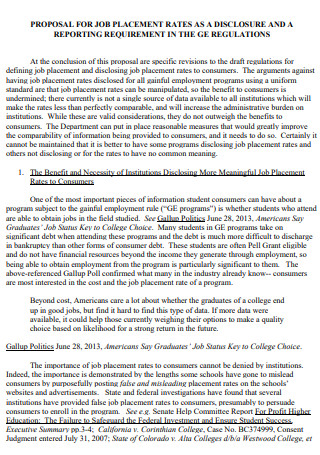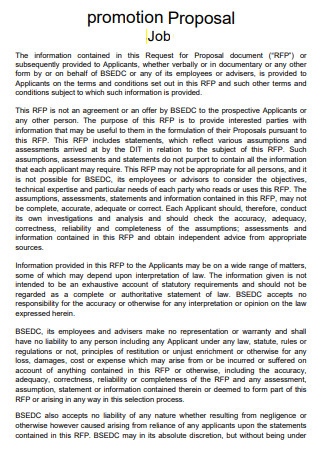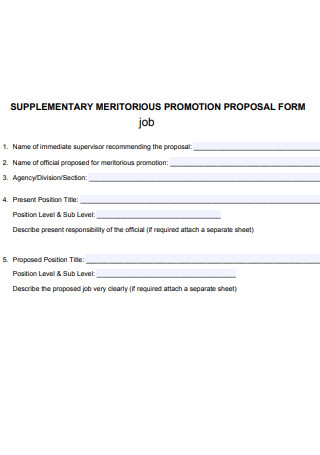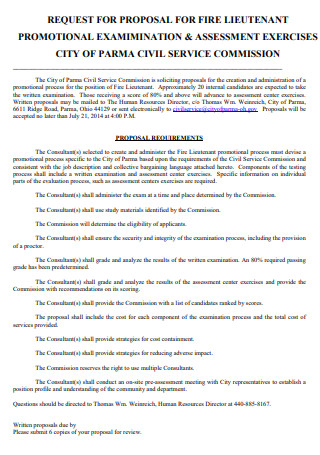5+ SAMPLE Job Promotion Proposal
FREE Job Promotion Proposal s to Download
5+ SAMPLE Job Promotion Proposal
What Is a Job Promotion Proposal?
What Is a Job Promotion?
What Is the Importance of Job Promotion?
How to Ask for a Promotion?
What Will a Boss Require from An Employee Asking for Promotion?
How Do You Write a Job Promotion Proposal?
FAQs
How do you negotiate job promotion?
How to accept a job promotion?
What are the criteria to be promoted?
When can managers consider employees for promotion?
One of the most effective way of getting that dream position is making sure to write the best, convincing Job Promotion Proposal. This is the first step to communicating with the boss and starting a proper negotiation. You should also take a look at our Job Proposal.
What Is a Job Promotion Proposal?
A Job Promotion Proposal is a written document meant for your supervisor to request consideration for a higher position at the company. The proposal explains why exactly you deserve the position you are hoping for. Writing a job promotion proposal at the right time can increase chances of getting a promotion, as companies frequently hire internally and value initiative.
Although an employee can email a proposal, submitting a physical copy is a more professional approach. They can also send it via mail, so they will be notified when the formal letter is delivered. Keep in mind that a proposal should always be accompanied by an in-person conversation with the direct supervisor.
Overall, promotion at work is described as an employee’s advancement in job position and job title—in recognition of their effective work performance and substantial contributions toward the attainment of the company’s organizational goals.
What Is a Job Promotion?
A job promotion is when an employee is raised to a higher rank, position, or role within a business or an organization because of their outstanding performance. Job promotions are usually accompanied by increased responsibilities or a higher salary. They can raise an employee’s standing in the professional hierarchy and allow them to climb the corporate ladder.
Some new roles may require the promoted employee to work longer hours or adapt a new skill set. In some cases, career advancement opportunities are only available after establishing seniority at the company. In other companies, seniority, exceptional skill, and taking on extra responsibilities are typically the benchmarks for promotion.
To set it straight, if employees want to go up the career ladder, they must land promotions at work. Here are the benefits that a job promotion should have:
Increase In Pay. The promotion will move the employee to a position that belongs to a higher salary range. The employee may also become entitled to extra monetary benefits and perks—such as higher health and Medicare benefits, higher representation, transportation business plan allowances, use of a company vehicle, and others—depending on the nature and responsibilities of the new position.
A Boost in The Employee’s Self-Esteem. Having a promotion is one way of telling the employee that the management trusts him/her and their abilities, to carry out the duties and responsibilities of the new position. It is one thing to always be told verbally by the bosses that they did a great job, or that he/she is great asset to the company. Promoting employees is like an assertion of this level of trust and confidence, proving that the compliments are more than just empty words spoken to make sure they remain devoted to the company.
An Increase in The Employee’s Authority Within the Company. With greater responsibility piled on the newly promoted employee, one will find himself with more authority to exert when it comes to higher-level functions. One may now have an influence on decision-making processes. The higher position may also put them above other employees, so they have more power and influence contract over them.
Along with a rise in authority and raise in pay, promotion also carries with it a boost in the employee’s status or social standing. These are not insignificant changes, considering the impact it will have on the individual, as well as the other people around the—specifically the other employees of the company and other individuals or entities that they come across in the performance plan of their work duties and responsibilities.
What Is the Importance of Job Promotion?
A promotion is seen as a desire by employees because of the impact a promotion has on pay, responsibility, authority, and the ability to influence broader organizational decision-making. A promotion raises the status of the employee who receives a promotion which is a noticeable sign of esteem from the employer.
Individual contributors must be qualified for promotions that recognize and reward their role as contributors. A promotion is a powerful communication tool about what is valued within a company or an organization. Hence, a promotion must be available to employees who play any role in the contribution of work and value.
Sometimes a promotion results in an employee taking on responsibility for managing or supervising the work of other employees. Decision-making authority tends to come up with a promotion as well. Usually, a promotion moves an employee’s job up to one level on an organizational chart.
How to Ask for a Promotion?
It may be time to take your present position to a higher level if you have been working at a company where you’ve drastically impacted the company’s business and taken on increased responsibility. Consider the following steps to ask for a promotion if you have put in the hard work and deserve to progress your current role:
What Will a Boss Require from An Employee Asking for Promotion?
Many employers require you to submit a letter of intent when applying for a promotion within a company. A letter of intent is like a cover letter but more detailed. This provides not only a summary of qualifications but also a detailed description of accomplishments and career goals.
State Your Intention to Apply for The Promotion. Begin your letter by naming the position for which you intend to apply. If you work for a large company, also list your current department and position.
Emphasize your accomplishments. Talk about what you have done for the company since arriving there. Be specific about your performance levels. Use numbers, such as how much revenue you have generated, how many clients you handle, and awards and commendations you have received on the job. This is your chance to show that you deserve the promotion.
Outline your qualifications. Your first paragraph should include basic information, such as your education, work history and any professional licenses you hold. This will let your employer know that you meet the general requirements for the job.
Explain why you want the job. Take a paragraph to talk about why you wish to be promoted and what you will bring to that position. Talk about your future and career goals, and how this new position would fit in with them.
Talk about what you will bring to the company. End your letter with a paragraph about why the company would benefit by promoting you. Keep in mind ways you can help the company save money, earn more revenue, and project a good public image.
How Do You Write a Job Promotion Proposal?
Most employers are willing to talk about the possibility of promoting you, if they have the resources necessary for compensation and agree that you deserve to take on more responsibilities. Creating a proposal for a promotion is not as complicated as you may think. A proposal for your own promotion does not have to follow a certain format, although it should be professional looking. Although it might be proper to e-mail a copy of the proposal to them as well it is usually best to present the proposal to your boss or superiors in person.
Step 1: Write the Best Intro
Write an introductory paragraph that defines what position you have now and what position you would like to have. If the position you want does not exist at your company, define what new role you could fulfill and offer a suggested title for the position.
Step 2: Make A List of Your Qualifications
List the accomplishments and reasons that qualify you for the promotion. These can be in bullet-point form or paragraph form. Include notable achievements such as a big sale or winning an important client list. Explain how you are not only meeting the requirements of your current job title, but how you are exceeding expectations and would like the opportunity to take on more responsibilities. Remind your boss how long you have been doing your current job and how you have grown in the position since you started.
Step 3: Explain Your Reasons
List reasons why you think you can handle the responsibilities of the promotion. For instance, if the promotion would require more calls with clients, remind your boss how well you are currently performing in client meetings or how competent you are at giving company presentations. Also, acknowledge that you want to become a better asset for the company. Although you may want the promotion for reasons like money or status, it is crucial to express that you also want the promotion because you are invested in the welfare of the company. Share your dedication and commitment to the company’s goals and discuss how the promotion could help you assist with furthering them.
Step 4: Do Your Math
If you have figures to show that promoting you will benefit the company financially, put them in your proposal. Numbers carry weight for any business decision.
Step 5: Close with An Opening
Include a closing paragraph that implies your desire to discuss the subject further in person. This lets you omit certain questions about salary or the date you might receive the promotion, since these types of details should be discussed in person with your boss or superior.
FAQs
How do you negotiate job promotion?
Prepare to negotiate if you are considering asking your boss for a promotion. You must also understand what your boss is looking for and what you can offer that no other employee can. The burden of proof is on you, so you will need to make a strong case showing why you deserve a better position. Make sure to know your value, you already set reasonable expectations, you understand the position, and you ask at the right time.
How to accept a job promotion?
Your ultimate success depends on how you respond to the news. After knowing that you have earned a job promotion may stimulate feelings of joy and satisfaction. After all, it signifies that your hard work has paid off and confirms that your employer recognizes your abilities and your value to the company. In expressing your gratitude, consider all angles of the process before accepting a promotion. Be ready with the job requirements, learn about the pay and benefits, then think it over, and give them your answer when you are all set.
What are the criteria to be promoted?
Companies should promote employees based on their performance and workplace conduct. Reasonable criteria for promotion are experience in the job or tenure, high performance level in recent review cycles, skillset that matches the minimum requirements of the new role, and personal motivation and willingness for a change in responsibilities.
When can managers consider employees for promotion?
Promotions may occur when a job opening is presented internally as well as externally. A position opens unexpectedly, and a company wants to fill it from within. When an employee has a good performance evaluation, their manager deems them ready for the next step in their career, and the employee acquires a credential that allows them to advance.
People’s career might stall for several reasons if they just sit around and wait for a promotion. To make it easier for your employer to pass you by as well because they either want to save money on compensations, avoid possible problems with employees who do not get promoted, or simply forgets that you have not had a promotion in a while. Taking a practical attitude when it comes to getting a promotion can help you climb the ladder faster at your company. Create a few goals that can ease the path to a promotion.
Moreover, managers may often choose to expand employees’ tasks, authority, and autonomy without promoting them directly. Sometimes, these changes do not always come with a formal title change. Managers should keep an updated job promotion plan in their team members’ file and talk about future career moves during performance reviews.

